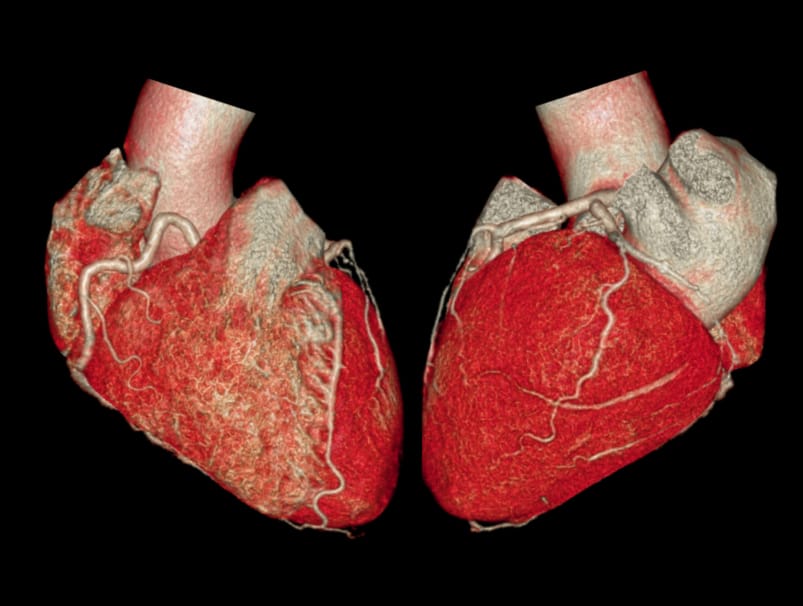You may be referred, after a consultation with one of our Cardiologists, for a Cardiac CT. We utilise the latest wide volume and dual source scanners to achieve excellent imaging quality at the lowest possible x-ray dose.
Cardiac CT (sometimes referred to as Coronary CT or CT coronary angiography) is a new imaging technique that allows high resolution pictures to be taken of the coronary arteries surrounding the heart. It is the most sensitive non-invasive test for detecting coronary disease and blockages without interventional procedures or a hospital stay. It is especially useful in determining whether or not the coronary arteries are the cause of symptoms such as shortness of breath or chest discomfort.
Cardiac CT enables a clear, three-dimensional picture to be taken of the heart, aorta, pulmonary vessels and coronary arteries. Cardiac CT may be used to look at the structure of the heart but the most common use is CT coronary angiography- using the CT scanner to image the coronary arteries and diagnose blockages and cholesterol deposits, common causes of heart attacks.
A cardiac CT enables the entire heart to be imaged in less than half a second with a typical resolution of 0.5mm.
Preparation
Limit caffeine consumption, including herbal tea, coffee, chocolate and cola – these can increase your heart rate
You are required to fast 2 hours before the procedure, you may drink water to maintain hydration.
Do not take medications like Viagra (sildenafil), Cialis (tadanafil), Levitra (vardenafil) 72 hours prior to your procedure. These medications can have an interaction with the medication used during the CT. If you are unsure, check with us or your GP.
Continue to take all of your normal medication on the day of the scan, unless you have been advised otherwise.
Do not exercise or perform strenuous activity for 2 hours prior to your CT.
Please advise our staff when making your appointment if you are pregnant, have a pacemaker, coronary artery bypass grafts, an irregular heart rhythm, or have had an allergic reaction to contrast agents (dye) in the past.
Please ensure you have had a blood test to check your kidney function in the 3 months prior to your CT. If you require a blood test we can organise a pathology request form or you can contact your GP.
You may need to take medication to slow your heart rate, as CTCA images are clearer when the heart rate is low. If you have asthma, diabetes, kidney problems or a history of allergies, you may not be able to have a CTCA. In these cases, your doctor will be able to advise you on another treatment option
Procedure
A cannula (small tube) will be placed in your arm.
You will be taken to the procedure room and asked to put on a hospital gown
You will lie on a CT scanning bed that slides under the CT machine
You will be connected to a heart rate monitor which will watch your heart rate and rhythm
The X-ray dye will be injected in the cannula
You will be asked to hold your breath for around 10 seconds and lie very still each time an image is taken
Results
Your doctor will make a follow-up appointment with you to discuss the results of your CTCA. If the images show narrowing or blockages, your doctor will help you to decide the best treatment option for you.
Most tests are reported and forwarded to the referring doctor within 48 hours. Any results that need immediate attention will be relayed to your Cardiologist on the same day.
Have Questions?
Make an Appointment to get all your cardiology questions answered by our experienced team
Quick and Easy Consultation & Referral Process

